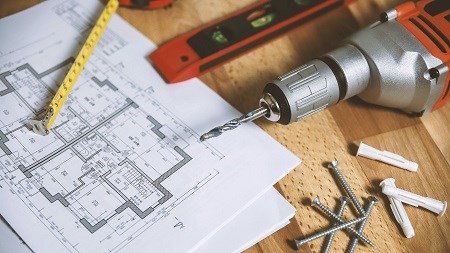Building your own home is hard work, but the results can be rewarding if you plan properly and are prepared to put in the time and effort to ensure the job gets done just right.
Planning the budget
Building costs vary widely from one region to another. However, the average cost of building a conventional suburban house in South Africa’s major centres at present ranges from about R10 000 to R15 000/m2.. This can increase to R25 000 or more for a luxury home. The building cost calculation is derived by adding up the final build costs and dividing the total by the house size, but the actual structure is just a portion of the total project cost. Using R15 000/m2 as a base, a 200m2 house could cost R3 million to build. Then you need to add the price of the land and finishes, professional fees, council planning approvals, water and electrical connections, NHBRC registration, municipal rates and service costs, and any other expenses such as the cost of renting while you build. You can save significantly by managing the project yourself instead of relying on a professional project manager. However, you should be aware that this is a full-time job and could take up to a year to complete. Other possible savings avenues could include less expensive finishes and fittings and a simplified building design. Get all the quotes in before you finalise your budget, or if possible, hire a quantity surveyor to do a detailed cost analysis.
Financing a new build
Banks will finance the construction of a house on vacant land, but the criteria for granting a loan are slightly different to those that apply to a mortgage on an existing home. Banks will usually ask for a higher deposit when financing a new build. Also, with a building loan the bank pays out the loan in tranches, as each stage of the construction process is completed. In addition to checking your credit record and FICA documents such as proof of your identity and address, the bank will ask for the following documents when you apply for a building loan:
- A site plan.
- Provisional drawings for the construction.
- A signed agreement between you and your chosen contractor. This document will include details of the building materials to be used, the budget for each phase of the project, and plans approved by the municipality.
- Proof that the contractor is registered with the National Home Builders Registration Council (NHBRC), and is covered by contractors all risk insurance cover.
- A lien waiver from the builder, stating the builder is waiving all rights to the property and any materials and labour used in construction on the site.
Design
Building plans can be drawn up by an architect or a draughtsperson, who will also usually oversee the municipal approval process. Before appointing anyone you should ask to see some of their previous projects to make sure their designs match your ideas. It’s also a good idea to choose a building style that appeals to you, as a starting point. In addition to the floor plan, roof design and building materials to be used, finalising decisions on lighting, flooring, kitchens and bathrooms, and finishes at the planning stage will make your build easier and cheaper. Any subsequent changes to the structure, electrical or plumbing installations will affect the cost and look of the overall project, so it’s best to plan ahead as much as possible.
Finishes and fittings to keep in mind:
Security – South African homes need effective security measures in place, including burglar alarms, electric fences, security gates and doors.
Swimming pools and water features. Landscaping – Puts the finishing touches to a house, turning it into a home.
Paint and sealers – Many products can ruin certain surfaces and are difficult to remedy. When budgeting for painting and sealing, remember to include the following:
Paint:
- Ceilings
- Skirtings
- Fascia boards
- Steel gates, balustrades or fencing (after galvanising)
Sealer
- Raw bricks walls
- Natural floor and wall tiles
Sealer or paint
- Internal doors and frames
- Garage doors
- Wood or steel windows
- Waterproofing on roof
Choosing a contractor
To minimise your risk, it’s best to appoint an established, reputable builder that can provide a fixed price quote for the entire project. Unfortunately, builders have been known to go bankrupt before completing projects, which could leave you with a partially-built house. This is why banks only pay over portions of the loan in instalments at pre-determined stages of construction. Even if you are not dependent on a mortgage loan, all contractors building homes in South Africa must be registered with the National Home Builders Registration Council (NHBRC), and should be covered by contractors all risk insurance cover.
On site
It’s unrealistic to expect a labourer earning a minimum wage to be as concerned as you are about your detailed finishes. For this reason, it’s important to be on site as often as possible, even if you have appointed a foreman and a project manager. Problems such as a ceiling that is too low, or a window in the wrong place may be impossible to rectify at a later stage. And the importance of careful cashflow planning cannot be overemphasised. Banks are generally cautious and draw amounts are often less than expected, so you need to be prepared for any possible additional cash outlay to avoid project delays.

